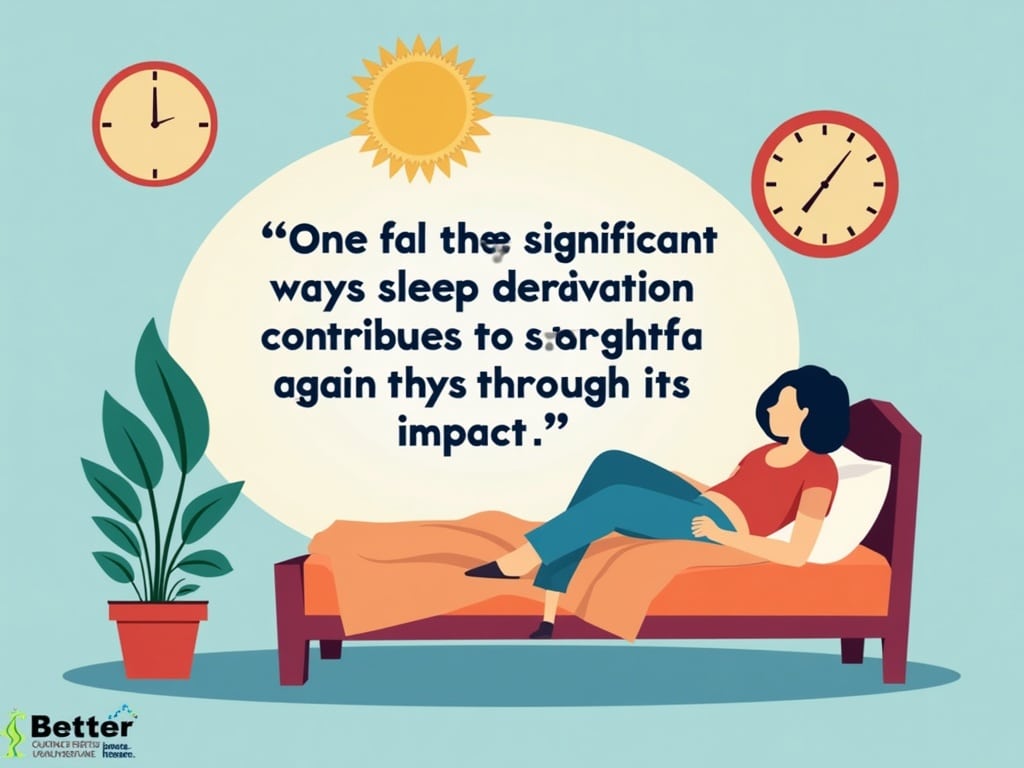The Sleepless Cycle: Unraveling the Link Between Sleep Deprivation and Weight Gain
Ever find yourself reaching for a bag of chips after a night of tossing and turning? It's not just you. The connection between sleep deprivation and weight gain is a complex web of hormonal imbalances, altered metabolism, and poor food choices, making it a real challenge for anyone trying to maintain a healthy lifestyle. Let's dive into the science behind this connection and explore practical strategies to break the sleepless cycle.
The Hormonal Havoc: How Lack of Sleep Messes with Your Appetite
One of the most significant ways sleep deprivation contributes to weight gain is through its impact on hunger hormones. Two key players here are ghrelin and leptin.
**Ghrelin:Often dubbed the hunger hormone, ghrelin signals to your brain that it's time to eat. When you're sleep-deprived, ghrelin levels surge, leading to increased appetite. Imagine your stomach constantly growling, even after you've eaten – that's ghrelin in action.
**Leptin:Conversely, leptin is the satiety hormone, telling your brain that you're full and it's time to stop eating. Insufficient sleep reduces leptin levels, making it harder to feel satisfied after a meal. You might find yourself eating larger portions or snacking more frequently, chasing that elusive feeling of fullness.
This hormonal imbalance creates a perfect storm for overeating. Your body is essentially tricked into thinking it needs more fuel, even when it doesn't, and the signals that tell you to stop eating are weakened.
The Science Behind the Hormones
Numerous studies have demonstrated the direct link between sleep duration and these hormonal shifts. For instance, research published in the *Annals of Internal Medicinefound that individuals who slept only four hours a night for two consecutive nights had significantly higher ghrelin levels and lower leptin levels compared to when they slept ten hours. This translated to increased hunger and a preference for high-calorie foods.
Beyond Hormones: Sleep Deprivation's Impact on Metabolism and Energy Expenditure
It's not just about what you eat; it's also about how your body processes food. Sleep deprivation can disrupt your metabolism, the complex chemical process that converts food into energy.
**Reduced Insulin Sensitivity:Studies have shown that lack of sleep can decrease insulin sensitivity. Insulin is crucial for regulating blood sugar levels, and when your body becomes less sensitive to it, glucose can build up in your bloodstream, potentially leading to weight gain and increasing the risk of type 2 diabetes.
**Decreased Energy Expenditure:While you might think being awake longer would burn more calories, the opposite is often true. Sleep-deprived individuals tend to be less physically active. Fatigue and lack of motivation can make it harder to stick to your exercise routine, further contributing to weight gain.

The Vicious Cycle: How Weight Gain Further Disrupts Sleep
The relationship between sleep and weight is often cyclical. Weight gain, especially around the neck, can contribute to sleep apnea, a condition characterized by pauses in breathing during sleep. Sleep apnea further disrupts sleep, exacerbating the hormonal imbalances and metabolic issues mentioned earlier.
Understanding Sleep Apnea
Sleep apnea not only reduces sleep quality but also leads to daytime fatigue, cognitive impairment, and increased risk of cardiovascular problems. Treating sleep apnea is crucial for breaking this cycle and improving both sleep and weight management.
Food Choices Under the Influence of Sleep Deprivation
When you're running on fumes, healthy eating habits often go out the window. Sleep deprivation can significantly influence your food choices, leading you to crave sugary, fatty, and processed foods.
**Craving High-Calorie Foods:Multiple studies indicate that sleep-deprived individuals have a stronger preference for high-calorie, energy-dense foods. This is likely due to the brain seeking a quick energy boost to compensate for the lack of sleep.
**Impaired Decision-Making:Lack of sleep can also impair cognitive function, making it harder to resist tempting treats and make healthy food choices. That carefully planned salad might suddenly seem less appealing than a slice of pizza.
Breaking the Sleepless Cycle: Practical Strategies for Better Sleep and Weight Management
While the connection between sleep deprivation and weight gain might seem daunting, there are practical strategies you can implement to break the cycle and improve both your sleep and your waistline.
1. Prioritize Sleep Hygiene
Creating a consistent sleep routine is paramount. This includes:
**Going to bed and waking up at the same time every day**, even on weekends, to regulate your body's natural sleep-wake cycle (circadian rhythm).
**Creating a relaxing bedtime routineto wind down before sleep. This could include taking a warm bath, reading a book, or listening to calming music.
**Ensuring your bedroom is dark, quiet, and cool**. These environmental factors can significantly impact sleep quality.
**Avoiding caffeine and alcohol before bed**, as they can interfere with sleep patterns.
2. Optimize Your Diet
Focus on a balanced diet rich in whole foods, including:
**Fruits and vegetables:Packed with vitamins, minerals, and fiber, these help regulate appetite and provide sustained energy.
**Lean protein:Essential for muscle building and repair, protein also promotes satiety and helps stabilize blood sugar levels.
**Whole grains:Choose whole grains over refined grains for their higher fiber content, which can help regulate blood sugar and promote feelings of fullness.
**Healthy fats:Include sources of healthy fats, such as avocados, nuts, and olive oil, for their role in hormone production and overall health.
3. Incorporate Regular Exercise
Regular physical activity can improve sleep quality and help manage weight. However, timing is key:
**Avoid intense workouts close to bedtime**, as they can be stimulating and interfere with sleep.
**Aim for moderate-intensity exercise**, such as brisk walking or cycling, during the day to promote both physical and mental well-being.
4. Manage Stress Levels
Stress can be a major contributor to sleep problems. Implementing stress-reducing techniques can significantly improve sleep quality:
**Meditation and mindfulness:These practices can help calm the mind and reduce anxiety, promoting relaxation and better sleep.
**Yoga:Combines physical postures, breathing techniques, and meditation to promote overall well-being and improve sleep.
**Spending time in nature:Exposure to natural light and fresh air can help regulate your circadian rhythm and reduce stress levels.
5. Consider Professional Help
If you've tried these strategies and are still struggling with sleep deprivation and weight gain, seeking professional help is crucial. A doctor or sleep specialist can help identify underlying sleep disorders and recommend appropriate treatment options, such as cognitive behavioral therapy for insomnia (CBT-I) or continuous positive airway pressure (CPAP) therapy for sleep apnea.
The Takeaway: Prioritizing Sleep for a Healthier You
The link between sleep deprivation and weight gain is undeniable. By understanding the hormonal, metabolic, and behavioral factors involved, you can take proactive steps to prioritize sleep and improve your overall health and well-being. Remember, a good night's sleep isn't just a luxury; it's a necessity for a healthy and balanced life. So, turn off the screens, dim the lights, and make sleep a priority – your body will thank you for it.

